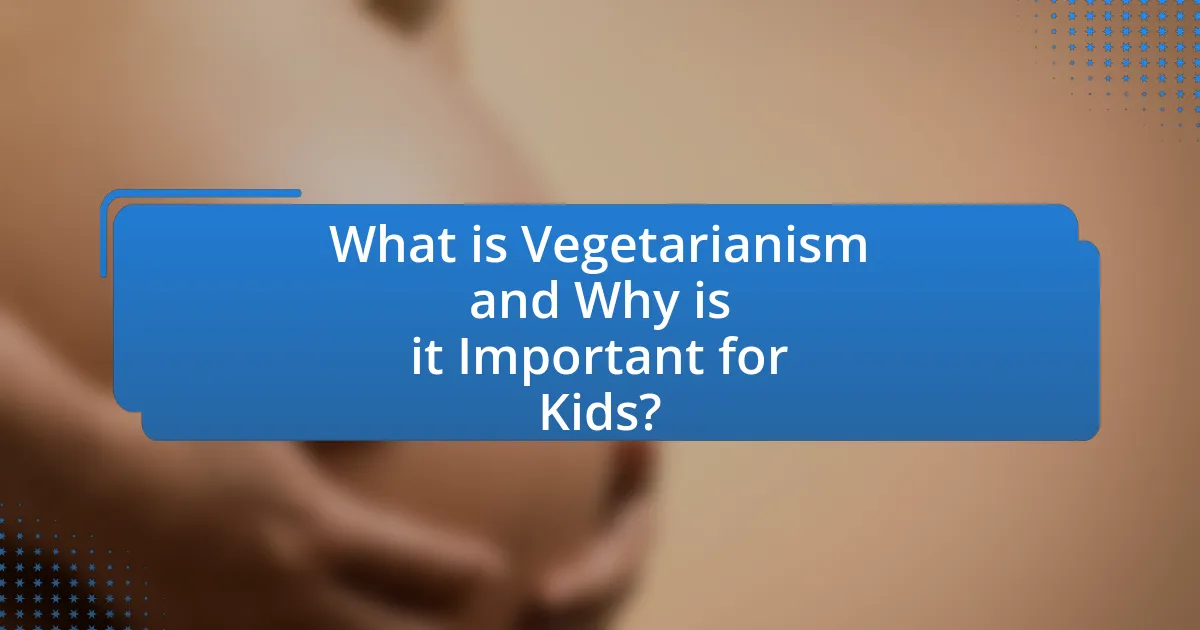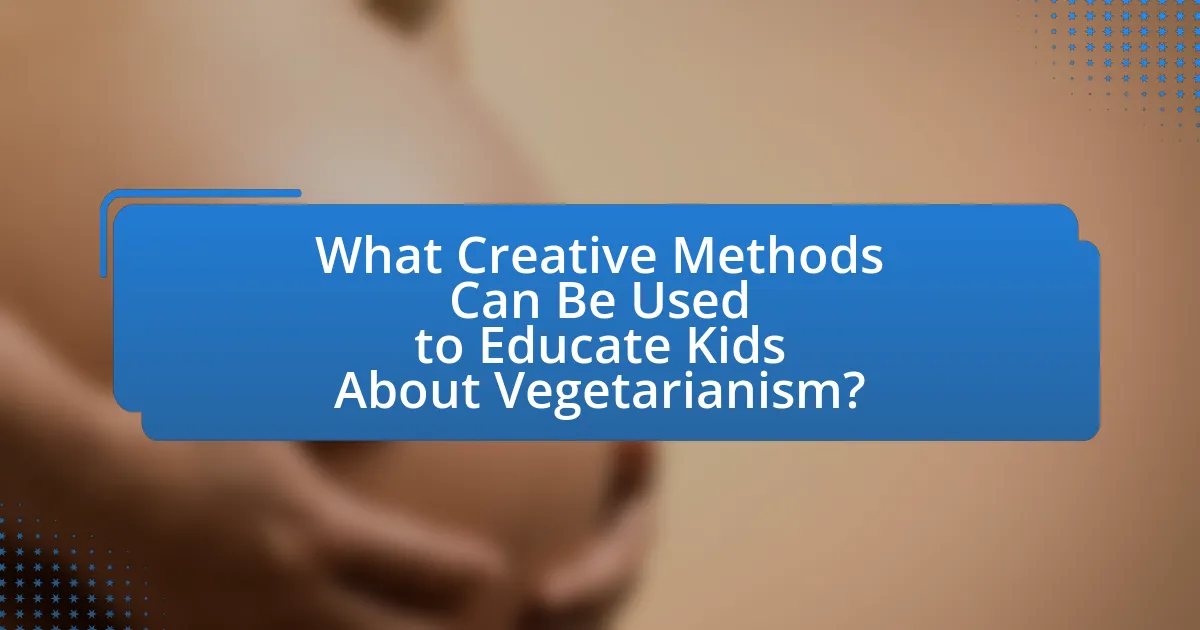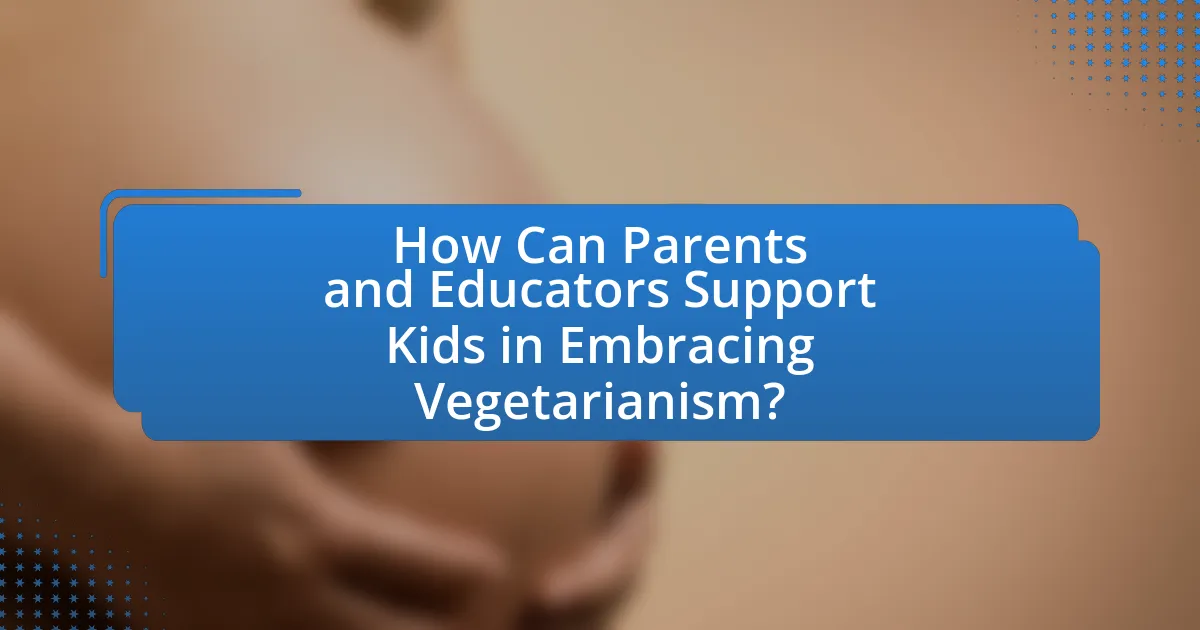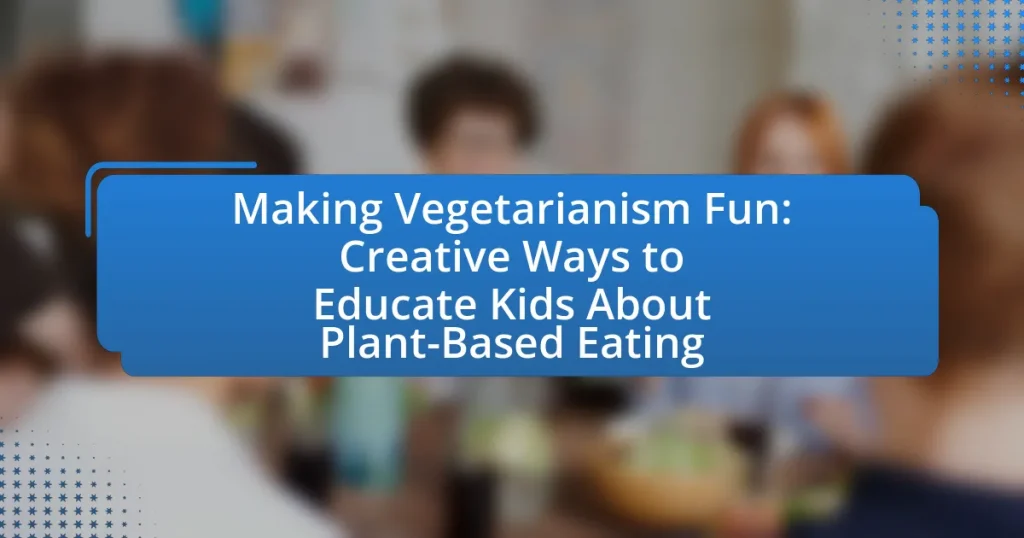Vegetarianism is a dietary practice that excludes meat, fish, and poultry, emphasizing plant-based foods, which is particularly important for children’s health and development. This article explores the benefits of vegetarianism for kids, including essential nutrients, improved health outcomes, and environmental sustainability. It discusses how education, interactive activities, and creative methods, such as cooking classes and storytelling, can effectively engage children in plant-based eating. Additionally, it highlights practical strategies for parents and educators to support kids in embracing vegetarianism, making the dietary transition enjoyable and informative.

What is Vegetarianism and Why is it Important for Kids?
Vegetarianism is a dietary practice that excludes meat, fish, and poultry, focusing instead on plant-based foods such as fruits, vegetables, grains, legumes, nuts, and seeds. It is important for kids because it can promote healthier eating habits, provide essential nutrients, and support environmental sustainability. Research indicates that vegetarian diets can be rich in vitamins, minerals, and fiber while being lower in saturated fats, which can contribute to better overall health in children. Additionally, a study published in the Journal of the American Dietetic Association highlights that well-planned vegetarian diets can meet the nutritional needs of children and adolescents, fostering healthy growth and development.
How can vegetarianism benefit children’s health?
Vegetarianism can significantly benefit children’s health by providing a diet rich in essential nutrients while reducing the risk of chronic diseases. A plant-based diet is typically high in fruits, vegetables, whole grains, and legumes, which are associated with improved heart health, better digestion, and lower obesity rates. Research published in the Journal of the American Dietetic Association indicates that vegetarian children often have lower cholesterol levels and blood pressure compared to their meat-eating peers, contributing to long-term health benefits. Additionally, a vegetarian diet can enhance cognitive function and academic performance due to the abundance of vitamins and minerals found in plant foods, as highlighted in studies from the American Journal of Clinical Nutrition.
What nutrients are essential in a vegetarian diet for kids?
Essential nutrients in a vegetarian diet for kids include protein, iron, calcium, vitamin B12, vitamin D, omega-3 fatty acids, and zinc. Protein is crucial for growth and development, and can be obtained from legumes, nuts, and dairy products. Iron, necessary for oxygen transport in the blood, can be sourced from lentils, chickpeas, and fortified cereals, while vitamin C-rich foods enhance its absorption. Calcium is vital for bone health and can be found in fortified plant milks, tofu, and leafy greens. Vitamin B12, important for nerve function, is primarily found in animal products, so fortified foods or supplements are recommended for vegetarians. Vitamin D supports calcium absorption and can be obtained from fortified foods or sunlight exposure. Omega-3 fatty acids, essential for brain health, can be sourced from flaxseeds, chia seeds, and walnuts. Lastly, zinc supports immune function and can be found in beans, nuts, and whole grains.
How does a plant-based diet impact children’s growth and development?
A plant-based diet positively impacts children’s growth and development by providing essential nutrients that support physical and cognitive growth. Research indicates that children who consume a well-planned plant-based diet can achieve adequate protein, vitamins, and minerals necessary for their development. For instance, a study published in the Journal of the American Dietetic Association found that vegetarian children had similar growth patterns to their omnivorous peers when their diets were appropriately balanced. This balance includes sufficient intake of iron, calcium, and vitamin B12, which are crucial for growth. Additionally, plant-based diets are rich in antioxidants and fiber, promoting overall health and reducing the risk of chronic diseases, which can further support healthy development in children.
Why should kids learn about plant-based eating?
Kids should learn about plant-based eating because it promotes healthier lifestyle choices and environmental sustainability. Research indicates that a plant-based diet can reduce the risk of chronic diseases such as obesity, diabetes, and heart disease, which are increasingly prevalent among children. Additionally, adopting plant-based eating habits can significantly lower carbon footprints; studies show that plant-based diets can reduce greenhouse gas emissions by up to 50%. Teaching kids about these benefits fosters a sense of responsibility towards their health and the planet, encouraging them to make informed dietary choices.
What role does education play in promoting vegetarianism among children?
Education plays a crucial role in promoting vegetarianism among children by providing knowledge about nutrition, environmental impact, and animal welfare. Through structured programs and engaging activities, children learn the benefits of a plant-based diet, which can lead to healthier eating habits. Research indicates that educational interventions, such as cooking classes and school-based nutrition programs, significantly increase children’s willingness to try vegetarian foods. For instance, a study published in the Journal of Nutrition Education and Behavior found that children exposed to nutrition education were more likely to choose fruits and vegetables over meat-based options. This evidence underscores the effectiveness of education in fostering a positive attitude towards vegetarianism in young audiences.
How can understanding vegetarianism influence children’s food choices?
Understanding vegetarianism can significantly influence children’s food choices by promoting awareness of health, environmental, and ethical considerations associated with plant-based diets. When children learn about the nutritional benefits of vegetarianism, such as increased intake of fruits, vegetables, and whole grains, they are more likely to choose healthier food options. Research indicates that children exposed to vegetarian concepts are more inclined to try and accept plant-based foods, leading to a broader palate and healthier eating habits. Additionally, discussions around the environmental impact of meat consumption can foster a sense of responsibility, encouraging children to make food choices that align with sustainability. This educational approach not only shapes their immediate preferences but also instills lifelong habits that prioritize health and environmental stewardship.

What Creative Methods Can Be Used to Educate Kids About Vegetarianism?
Interactive cooking classes can effectively educate kids about vegetarianism by engaging them in hands-on experiences. These classes allow children to learn about plant-based ingredients, nutritional benefits, and cooking techniques while preparing vegetarian meals. Research indicates that children who participate in cooking activities are more likely to try new foods and develop healthier eating habits. For instance, a study published in the Journal of Nutrition Education and Behavior found that cooking classes increased children’s willingness to consume fruits and vegetables. Additionally, incorporating games and storytelling related to vegetarianism can enhance understanding and retention of information, making the learning process enjoyable and memorable.
How can interactive activities make learning about vegetarianism fun?
Interactive activities can make learning about vegetarianism fun by engaging participants through hands-on experiences that stimulate curiosity and creativity. For instance, cooking classes allow individuals to prepare vegetarian dishes, fostering a sense of accomplishment and encouraging exploration of new flavors. Additionally, interactive games, such as scavenger hunts focused on identifying plant-based foods, can enhance knowledge retention while promoting teamwork and excitement. Research shows that experiential learning, which includes interactive activities, significantly improves engagement and understanding, making the educational process enjoyable and effective.
What types of games can teach kids about plant-based foods?
Educational games that teach kids about plant-based foods include cooking simulation games, gardening games, and interactive quizzes. Cooking simulation games, such as “Veggie World,” allow children to prepare virtual plant-based meals, enhancing their understanding of ingredients and nutrition. Gardening games, like “Plant It,” engage kids in growing virtual plants, teaching them about the life cycle of vegetables and the importance of sustainable practices. Interactive quizzes, available on platforms like Kahoot, can reinforce knowledge about plant-based foods through fun, competitive learning. These types of games effectively combine entertainment with education, making learning about plant-based eating enjoyable and engaging for children.
How can cooking classes engage children in vegetarian cooking?
Cooking classes can engage children in vegetarian cooking by incorporating hands-on activities that allow them to explore and create their own plant-based dishes. These classes can include interactive lessons where children learn about the nutritional benefits of vegetables, legumes, and grains, fostering a sense of curiosity and ownership over their food choices. Research indicates that children are more likely to try new foods when they are involved in the cooking process, as demonstrated in studies showing increased vegetable consumption among kids who participate in cooking activities. By making the experience fun and educational, cooking classes can effectively promote a positive attitude towards vegetarianism among children.
What role do stories and media play in educating kids about vegetarianism?
Stories and media play a crucial role in educating kids about vegetarianism by making the concept relatable and engaging. Through animated films, books, and interactive content, children can learn about the benefits of plant-based eating in a fun and accessible way. For instance, stories featuring animal characters can foster empathy and encourage kids to consider the impact of their food choices on animals and the environment. Research indicates that children are more likely to adopt vegetarian practices when they are exposed to positive narratives about vegetarianism, as these stories can shape their attitudes and beliefs. Additionally, media campaigns that highlight the health benefits of vegetarian diets can reinforce these messages, making them more memorable and influential.
How can children’s books promote plant-based eating?
Children’s books can promote plant-based eating by incorporating engaging narratives and relatable characters that highlight the benefits of fruits, vegetables, and plant-based foods. These stories can educate children about nutrition, environmental sustainability, and animal welfare in a fun and accessible manner. For instance, books like “The Very Hungry Caterpillar” by Eric Carle introduce various fruits and vegetables, encouraging children to explore healthy eating habits. Research indicates that children are more likely to adopt healthy eating behaviors when they are exposed to positive messages about food through storytelling, making children’s literature a powerful tool for promoting plant-based diets.
What educational videos or shows can inspire kids to try vegetarian meals?
Educational videos and shows that can inspire kids to try vegetarian meals include “VeggieTales,” which uses engaging storytelling and humor to promote vegetables and healthy eating habits. Another example is “The Magic School Bus,” particularly episodes that explore plant life and nutrition, encouraging curiosity about food sources. Additionally, “MasterChef Junior” features young chefs who often create vegetarian dishes, showcasing the creativity and fun in plant-based cooking. These programs effectively combine entertainment with educational content, making vegetarian meals appealing to children.

How Can Parents and Educators Support Kids in Embracing Vegetarianism?
Parents and educators can support kids in embracing vegetarianism by providing engaging education about plant-based diets and involving them in meal preparation. Research shows that children are more likely to adopt healthy eating habits when they understand the benefits of their food choices, such as improved health and environmental sustainability. By incorporating fun activities like cooking classes, gardening, and interactive lessons about nutrition, parents and educators can create a positive and enjoyable learning environment. Additionally, involving kids in selecting vegetarian recipes and shopping for ingredients fosters a sense of ownership and excitement about their dietary choices.
What strategies can parents use to encourage vegetarian eating at home?
Parents can encourage vegetarian eating at home by involving children in meal planning and preparation. When children participate in selecting recipes and cooking, they are more likely to try new plant-based foods. Research indicates that children who help prepare meals are more open to eating those meals, as they feel a sense of ownership and accomplishment. Additionally, parents can introduce a variety of colorful fruits and vegetables, making meals visually appealing, which can stimulate interest and curiosity in plant-based options. Engaging children in discussions about the benefits of vegetarianism, such as health advantages and environmental impact, can also foster a positive attitude towards vegetarian eating.
How can meal planning and preparation involve kids in vegetarian cooking?
Meal planning and preparation can involve kids in vegetarian cooking by assigning them specific tasks such as selecting recipes, measuring ingredients, and assembling dishes. Engaging children in these activities fosters their interest in plant-based eating and enhances their cooking skills. Research indicates that children who participate in meal preparation are more likely to try new foods and develop healthier eating habits. For example, a study published in the Journal of Nutrition Education and Behavior found that children who helped prepare meals were more inclined to consume fruits and vegetables. This hands-on involvement not only makes cooking enjoyable but also educates them about nutrition and the benefits of vegetarian diets.
What tips can help parents introduce new vegetarian foods to their children?
To effectively introduce new vegetarian foods to children, parents should involve them in the cooking process. Engaging children in meal preparation increases their interest in trying new foods, as studies show that children are more likely to eat foods they have helped prepare. Additionally, parents can present vegetarian dishes in fun and appealing ways, such as creating colorful plates or using fun shapes, which can make the food more enticing. Research indicates that visual appeal significantly influences children’s willingness to try new foods. Lastly, parents should introduce new vegetarian options gradually, pairing them with familiar favorites to ease the transition and reduce resistance. This method aligns with findings that suggest gradual exposure helps children adapt to new tastes and textures.
How can schools incorporate vegetarianism into their curriculum?
Schools can incorporate vegetarianism into their curriculum by integrating plant-based nutrition education into science, health, and culinary classes. This approach allows students to learn about the nutritional benefits of vegetarian diets, including lower risks of chronic diseases, as supported by studies from the American Journal of Clinical Nutrition, which highlight the health advantages of plant-based eating. Additionally, schools can organize cooking classes that focus on vegetarian recipes, encouraging hands-on learning and creativity in meal preparation. By incorporating field trips to local farms or farmers’ markets, students can gain a deeper understanding of where their food comes from and the importance of sustainable agriculture. These methods not only educate students about vegetarianism but also promote healthier eating habits and environmental awareness.
What programs or initiatives can promote plant-based eating in schools?
Programs and initiatives that can promote plant-based eating in schools include farm-to-school programs, nutrition education curricula, and school gardening projects. Farm-to-school programs connect local farms with schools to provide fresh produce, which increases student exposure to plant-based foods and encourages healthier eating habits. Nutrition education curricula, such as the Food and Nutrition Service’s “Team Nutrition” initiative, teach students about the benefits of plant-based diets, helping them make informed food choices. School gardening projects engage students in growing their own fruits and vegetables, fostering a connection to plant-based foods and promoting their consumption. These initiatives have been shown to improve dietary habits among students, as evidenced by studies indicating that schools implementing such programs see increased fruit and vegetable intake among children.
How can school gardens enhance children’s understanding of vegetarianism?
School gardens can enhance children’s understanding of vegetarianism by providing hands-on experiences that connect them to the food they eat. Engaging in the cultivation of fruits and vegetables allows children to learn about plant-based nutrition, the growth process, and the environmental benefits of vegetarian diets. Research indicates that children who participate in gardening activities are more likely to try and enjoy vegetables, as evidenced by a study published in the Journal of Nutrition Education and Behavior, which found that school gardening programs increased vegetable consumption among participants. This direct involvement fosters a deeper appreciation for vegetarianism and encourages healthier eating habits.
What are some practical tips for making vegetarianism enjoyable for kids?
To make vegetarianism enjoyable for kids, involve them in meal preparation and let them choose recipes. Engaging children in cooking fosters interest and ownership over their meals, making them more likely to try new vegetarian dishes. Research indicates that children who participate in cooking are more open to tasting and enjoying a variety of foods, including vegetables. Additionally, presenting meals in fun and creative ways, such as using colorful ingredients or arranging food into fun shapes, can enhance their appeal. Studies show that visually appealing meals can increase children’s willingness to eat healthy foods.
How can parents create fun and appealing vegetarian meals for children?
Parents can create fun and appealing vegetarian meals for children by incorporating colorful ingredients, engaging presentations, and interactive cooking experiences. Using a variety of vegetables, fruits, and whole grains not only enhances the visual appeal but also provides essential nutrients. For example, creating rainbow vegetable wraps or fruit skewers can make meals visually exciting. Additionally, involving children in the cooking process, such as letting them assemble their own tacos or pizzas with vegetarian toppings, fosters a sense of ownership and encourages them to try new foods. Research indicates that children are more likely to eat foods they help prepare, making this approach effective in promoting healthy eating habits.
What are some engaging ways to involve kids in food choices and preparation?
Engaging kids in food choices and preparation can be effectively achieved through hands-on activities like grocery shopping, meal planning, and cooking together. Involving children in grocery shopping allows them to select fruits and vegetables, fostering a sense of ownership and interest in their meals. Meal planning can be made fun by encouraging kids to choose recipes that incorporate plant-based ingredients, which helps them learn about nutrition and variety. Cooking together not only teaches essential skills but also provides an opportunity for kids to experiment with flavors and textures, making the experience enjoyable. Research indicates that children who participate in food preparation are more likely to try new foods and develop healthier eating habits, as highlighted in a study published in the Journal of Nutrition Education and Behavior.


